Photo: Bryan Steffy/Getty Images
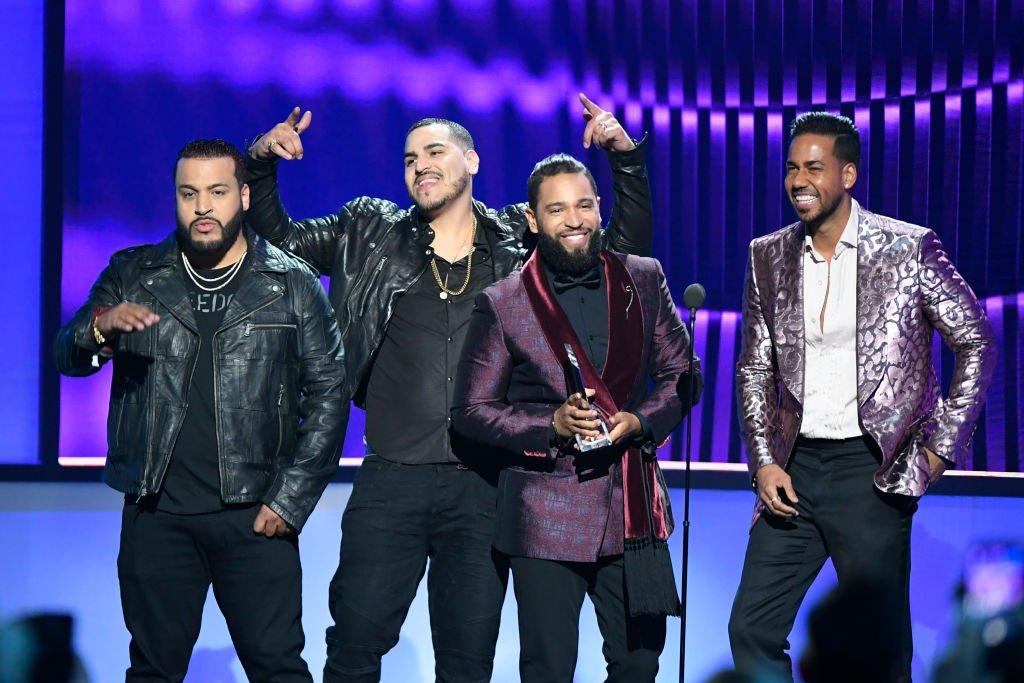
Aventura
news
Aventura Announce First U.S. Tour In 10 Years, Confirmed For Winter 2020
The seven-day tour, running from February through March 2020, will take the bachata group to major arenas across the nation
Latin GRAMMY-nominated bachata group Aventura are returning to the stage next winter for a much-anticipated headlining U.S. tour, their first trek across America in 10 years. The seven-day tour, running from February through March 2020, will take the Latin pop legends to major arenas throughout the nation.
The forthcoming La Gira Inmortal, translated to The Immortal Tour, is named after Aventura's most recent track, "Inmortal," the group's first new single in 10 years. Released this past April, "Inmortal" debuted at No. 5 on the Billboard Hot Latin Songs chart, while the band's greatest hits album, Lo Mejor De Aventura, was certified as the top-selling tropical album of 2019.
<style>.embed-container { position: relative; padding-bottom: 56.25%; height: 0; overflow: hidden; max-width: 100%; } .embed-container iframe, .embed-container object, .embed-container embed { position: absolute; top: 0; left: 0; width: 100%; height: 100%; }</style><div class='embed-container'><iframe src='https://www.youtube.com/embed//XlmaJ-yU46U' frameborder='0' allowfullscreen></iframe></div>
Most recently, Aventura reunited at a massive show headlined by lead vocalist and GRAMMY nominee Romeo Santos at MetLife Stadium in New Jersey this past September, following a string of shows in New York City in 2016.
Read: Bad Bunny, Rosalia, Juanes & More: 5 Unforgettable Moments From The 2019 Latin GRAMMYs
Hailed as the Kings of Bachata, a Latin American genre rooted in the Dominican Republic, Aventura are widely considered one of the most successful Latin pop groups of all time and pioneers of the modern bachata sound. Formed in the Bronx in New York, the group is a family band comprised of Dominican-American artists Lenny, Henry, Max and Anthony "Romeo" Santos; the latter launched a successful solo career following a long stint as songwriter and lead singer for Aventura and received his first and only GRAMMY nomination as a solo artist for his 2011 debut album, Formula, Vol. 1.
After breaking into the global mainstream via their 2002 hit "Obsesión," featuring Judy Santos (no relation), Aventura has since released five studio albums. Their 2006 live album, K.O.B. Live, was nominated for a Latin GRAMMY for Best Contemporary Tropical Album. In 2009, they became the first bachata act to perform at the White House, during President Barack Obama's first term.
<style>.embed-container { position: relative; padding-bottom: 56.25%; height: 0; overflow: hidden; max-width: 100%; } .embed-container iframe, .embed-container object, .embed-container embed { position: absolute; top: 0; left: 0; width: 100%; height: 100%; }</style><div class='embed-container'><iframe src='https://www.youtube.com/embed//8_QY5gFQUTg' frameborder='0' allowfullscreen></iframe></div>
The general on-sale for Aventura's 2020 U.S. tour begins Thursday, Dec. 12, at 10 a.m. local time via the Live Nation website. For more information and full tour routing, visit the band's official website.
Los Angeles' First Permanent Latin Music Gallery Launches At GRAMMY Museum
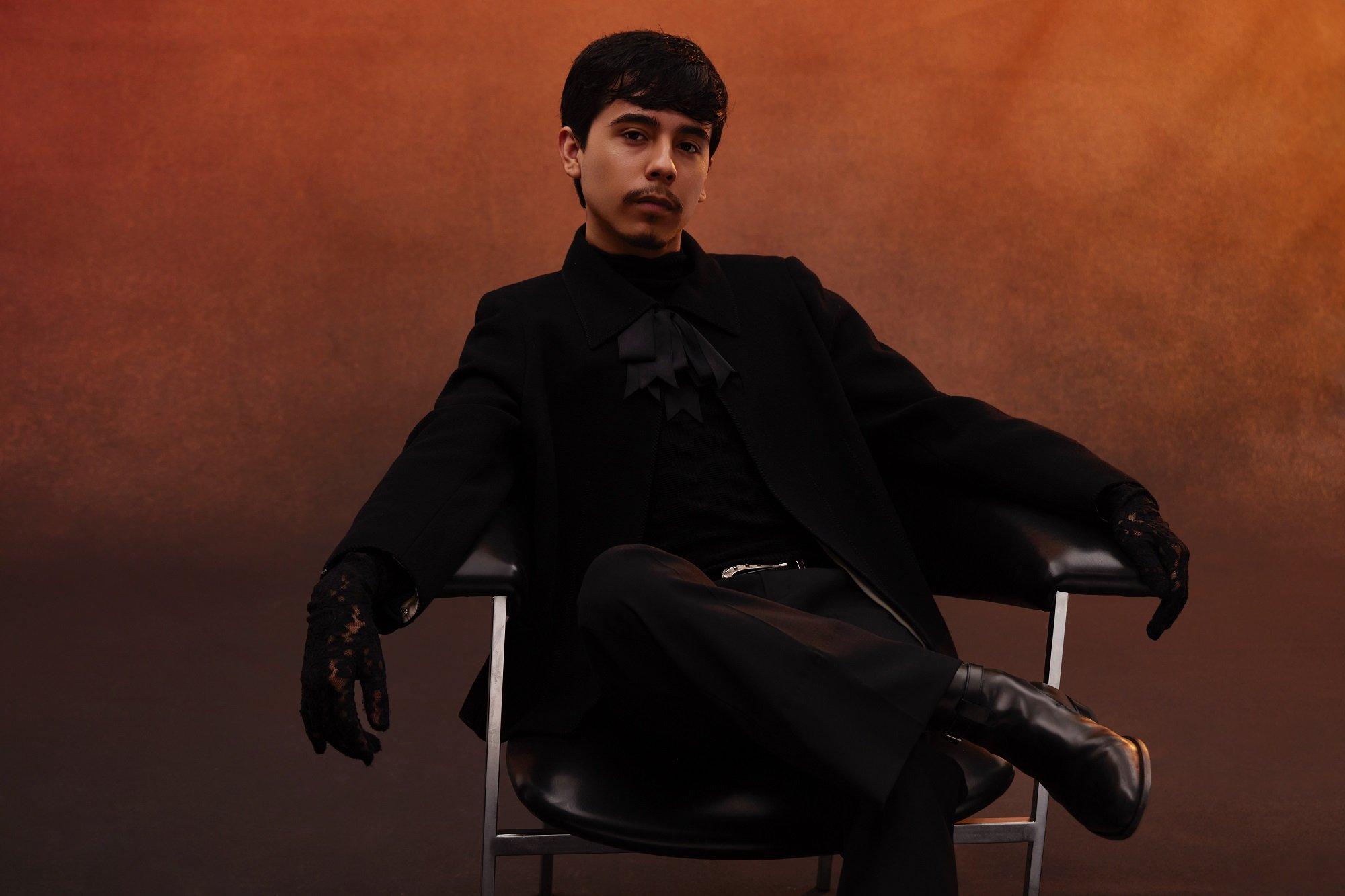
Photo: Le3ay Studio
interview
On 'Mirada,' Ivan Cornejo Redefines The Sound Of Sad Sierreño And Helps Fans Heal Through Music
Ivan Cornejo has always found solace in music. With his new LP, 'Mirada,' he wants his fans to experience that sense of belonging: "I write about emotions that everyone goes through or has been through."
Within the landscape of Música Mexicana, Ivan Cornejo is a rarity.
The 20-year-old California native stands out as one of the most intriguing acts in a genre represented by artists known for their flashy looks and music. Soft-spoken and warm, Cornejo's gentle demeanor effortlessly translates into his music and on-stage persona and musical productions.
Cornejo's songs and lyrics are far removed from the "corridos tumbados" that have taken over global charts. Fans have dubbed the Mexican American singer the "Gen Z therapist" because of his heartbreak-influenced lyrics and dexterity in creating the ethereal, melancholic sound known as sad sierreño.
With two albums under his belt, Cornejo makes his major label debut with Mirada, released on July 18 via Zaragoza Records / Interscope. The album features the wistful, sad sierreño sound that made Cornejo famous three years ago with "Está Dañada," a heart-wrenching ballad from his first LP, Alma Vacía (2021).
In the single, which has amassed over 270 million streams on Spotify, Ivan — then 17 — captivated listeners with powerful melodies accompanied by languid and nostalgic vocals, reciting verses filled with maturity beyond his years.
In Mirada, the Música Mexicana breakout star presents 12 solo songs inspired by summer nights, including singles "Aquí te Espero," "Donde Estás," "Baby Please," and "Intercambio Injusto." As with his previous productions, Cornejo makes heartbreak the central theme of his album while guitars and melodies reminiscent of alternative rock take center stage.
While the album doesn’t feature additional artists, Cornejo opened up to collaboration within the studio. The singer, used to collaborating solely with his producer, Frank Rio, encountered a challenge when bringing two additional creatives into the studio.
"The process for this new project was very different," Cornejo tells GRAMMY.com in a Zoom interview from Mexico City. "[Having other] creatives in the studio [resulted] a lot of learning. For example, my producer and I learned a lot from each other; we had constructive disagreements. We heard each other's opinions and learned a lot from this project."
The rising sad sierreño star discusses with GRAMMY.com the creative challenge of Mirada, the artistic boundaries he pushed along the way, the advantage behind bilingual songwriting, and the unexpected singer that influenced his lyrics.
This interview has been edited for length and clarity.
'Mirada' feels very personal, almost like a diary. How would you describe the album's overall theme and feeling?
While writing and recording this album, I wanted it to feel very personal, intimate, and gentle but with a little more uplifting sound.
I wanted the Mirada theme to feel like a nostalgic summer night. I want people to feel like they can play these songs on the beach, with friends, or alone in bed. I wanted it to feel a little euphoric.
The record showcases a blend of Latin and Anglo influences. Tracks like "Baby Please," "Dónde Estás," and "Aquí te espero" have a rock ballad feel. What inspired this fusion?
My influences come through a lot. I remember listening to my sister's and brother's music at eight while my parents would play classical regional Mexican music, like mariachi and corridos. As I grew up and started making music, it meshed into this sad sierreño and this funky Spanish alternative [genre].
The guitar is a staple in your sound. How did it become so central to your musical expression?
I started playing the guitar when I was about seven. I fell completely in love with the instrument. My mom tried to put me in violin classes, and I learned the instrument for a while, but the guitar kept winning me over. I kept learning more and more about the guitar, and around 12, I started learning songs by Radiohead, Arctic Monkeys and Tame Impala, and that's where my music emerged.
Mirada portrays the nostalgia around summer nights. How were those nights for you?
I spent it with my friends, making a bonfire and hanging out at the beach, pool, or jacuzzi.
Those nights when you just put your phone away and let the wind hit you and talk about your feelings, your thoughts are different, that kind of night.
What kind of music did you listen to on those summer nights?
Last summer, I listened to [Bad Bunny’s] Un Verano Sin Ti; [that album] was No. 1 on my playlist.
The year before, I listened to just any vibey music, like Arctic Monkeys, Tame Impala, or Radiohead, when I was alone. Cigarettes After Sex, I listened to them a lot during the summer when I was going to sleep. I always put them on.
You say that each track on this album is pushing the boundaries of your art. In what aspect are you breaking those barriers?
I go back to my last two albums [Alma Vacía and 2022’s Dañado,] and I want to grow as an artist and musician every time I listen to them.
Every time we enter the studio, [my producer] Frank Rio and I try our best to push the limits for ourselves and keep growing as artists. Vocally, musically, instrumentally, [we're] trying our best to make things sound even better.
How do you achieve that? Do you take vocal references from singers you like? Instrumentally, how do you break patterns within the genre?
Sometimes, when I feel something is missing from a song or I want to do something but don't know how to listen to a bunch of music that I think [is similar].
For example, each song on Mirada has a very different style. Depending on the style of the song, I’d listen to genres, styles, or certain ways that artists sing that match that song. Listening to those songs gives me ideas; it's like combining those ideas.
Vocally, for example, if I don't know how to sing a specific word or note, I listen to references and try to combine them in the best way possible.
Your lyrics show maturity beyond your years. Do you consider yourself an old soul?
Yes, I'm an old soul, for sure. When I was 7 years old, my brother would play Johnny Cash songs, and I was right behind him listening to them, downloading all the songs. I remember that for a while, I would go to sleep listening to Johnny Cash for an entire year.
Read more: Meet The Gen Z Women Claiming Space In The Regional Mexican Music Movement
Your song often references therapy sessions, and your fans even consider you the therapist of an entire generation. Do you feel that way?
I never realized my music had that effect. I would read comments saying, "Oh, he healed me" or, "I feel better now," or "he's my therapist, he's my comfort artist." That gave me a lot of joy because my music touched my fans in a very emotional way.
[Those comments] gave me the great idea of naming my [last] tour "Terapia." [Going to a concert] It's like you go to a therapist and you hear them. It all made sense. I hope my music is therapy for a lot of people.
Have you ever been to therapy yourself?
No, I have not. But... I should go. [Laughs.]
How do you articulate emotions clearly in your songs, especially without formal therapy experience?
I write about emotions that everyone goes through or has been through. And I try to write it in a way that sounds fresh and new. Also, melodies are very important because you can say something; depending on the melody, it can change your feelings. I try my best to make it hit the heart melodically and lyrically.
What about Spanish led you to express heartbreak in this language?
I was very inspired by Mexican music because there's something about the sound and the language that is very romantic. For example, there are some phrases in English that you might translate to Spanish, and they sound better in Spanish. Since my first language is English, I can translate them into Spanish and make them sound better and more emotional.
I try to write [songs first] in Spanish, but from time to time, when I get stuck, I start thinking in English. I try to think of just lyrics, and I'm like, okay, that's a cool lyric; how do I make it fit into this? And then, if it doesn't work, I'll try another one and another one until something works, or I get an idea in English, and it just works in Spanish.
[Being bilingual] gives you two perspectives, which helps a lot in the writing process.
What does it mean to you to represent Mexican American culture through your music?
It feels like you're put on a pedestal and have to be a role model. Being part of two cultures is a blessing, because you have two sides and perspectives. I'm very lucky to be here in Mexico and to learn about Mexican culture while still being from the United States and learning from American culture.
Did you feel you fit in when you were growing up?
No. At first, no. I was very shy.
Did music give you that sense of belonging?
Yeah, for sure. It gave me relief as I fit somewhere, and my voice was being heard. [It makes me feel] like I have support and people are [rooting for] me, and it helps me feel a bit understood.
As you enter your twenties and deal with growing fame, do you feel pressure being labeled as the voice of a generation?
I feel the pressure of being a role model, but it's a good kind of pressure. It helps me to make sure that I'm always giving my all. It's almost like motivation; I have to keep trying my best every time to be a role model.
It helps me to ensure that I'm always giving 100 percent and that it's like motivation, too. I have to keep trying my best each time to be a role model.
You sold out the mythical Houston Rodeo in April. How did singing to a crowd of 72,000 make you feel?
[Selena] and Johnny Cash are many of my favorite artists and artists that I look up to [have performed there]. It was a complete honor to play the Houston Rodeo and one of the scariest things I've ever done. [Laughs.]
It was scary at first. But when I realized that there were a good number of fans, I took out my in-ears, and I heard nearly the whole stadium singing back to me. It was such a beautiful and unforgettable night for me. It was a crazy experience.
The Latest News About Latin Music
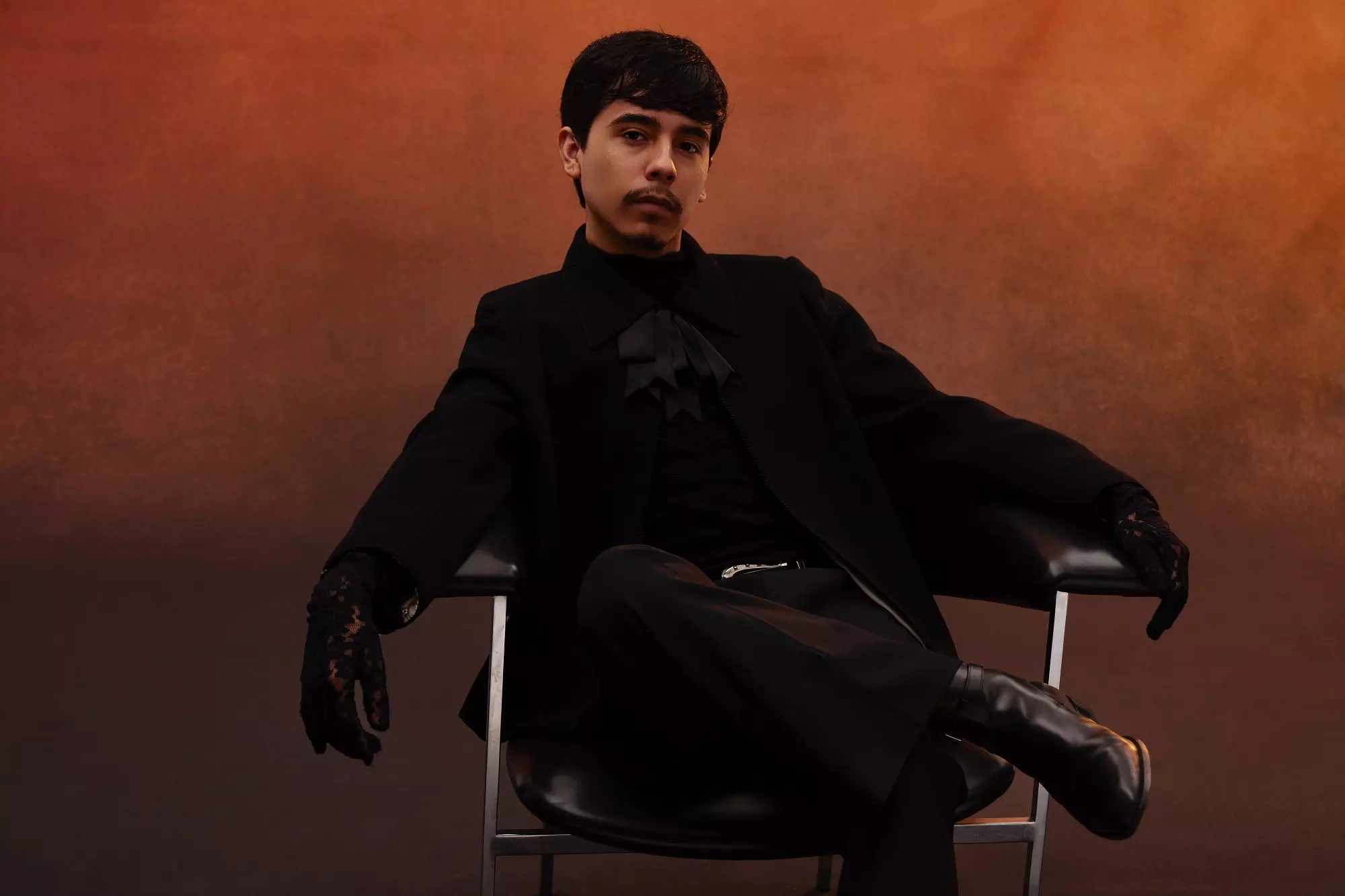
On 'Mirada,' Ivan Cornejo Redefines The Sound Of Sad Sierreño And Helps Fans Heal Through Music
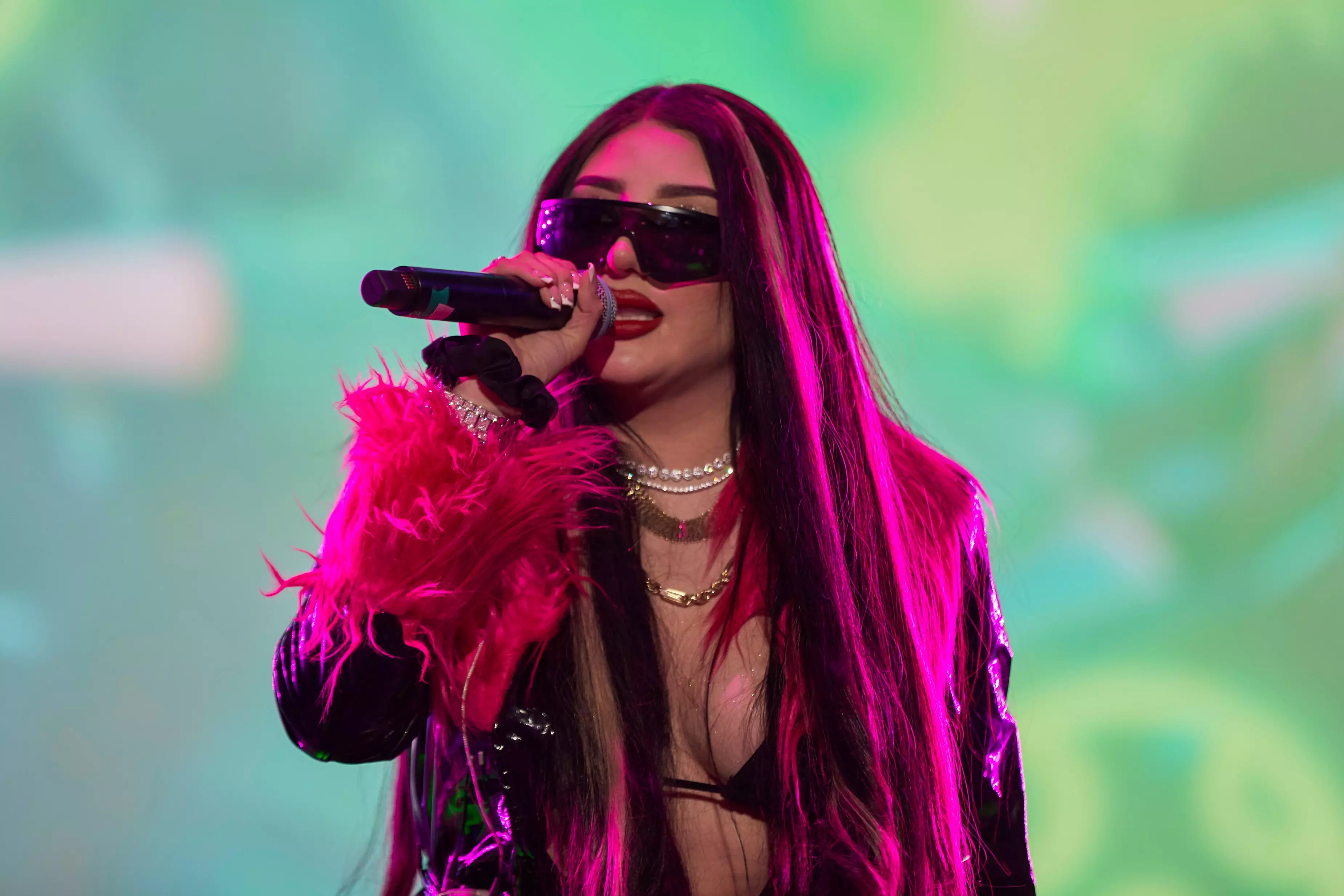
7 Artists Bringing Reggaeton Mexa To The World: El Malilla, Bellakath & More
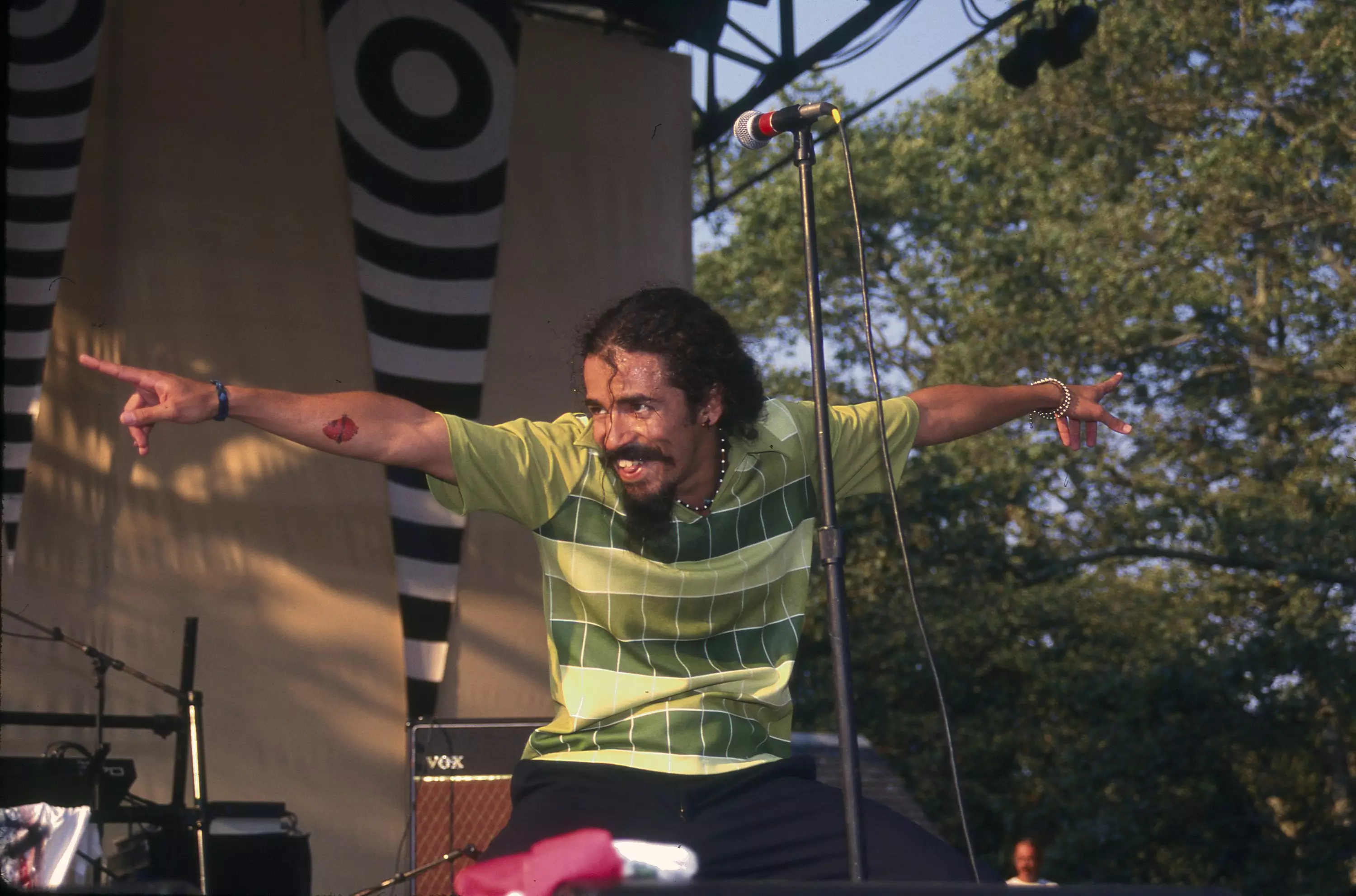
Revisiting 'Re': How Café Tacvba’s 1994 Masterpiece Changed Mexican Music Forever
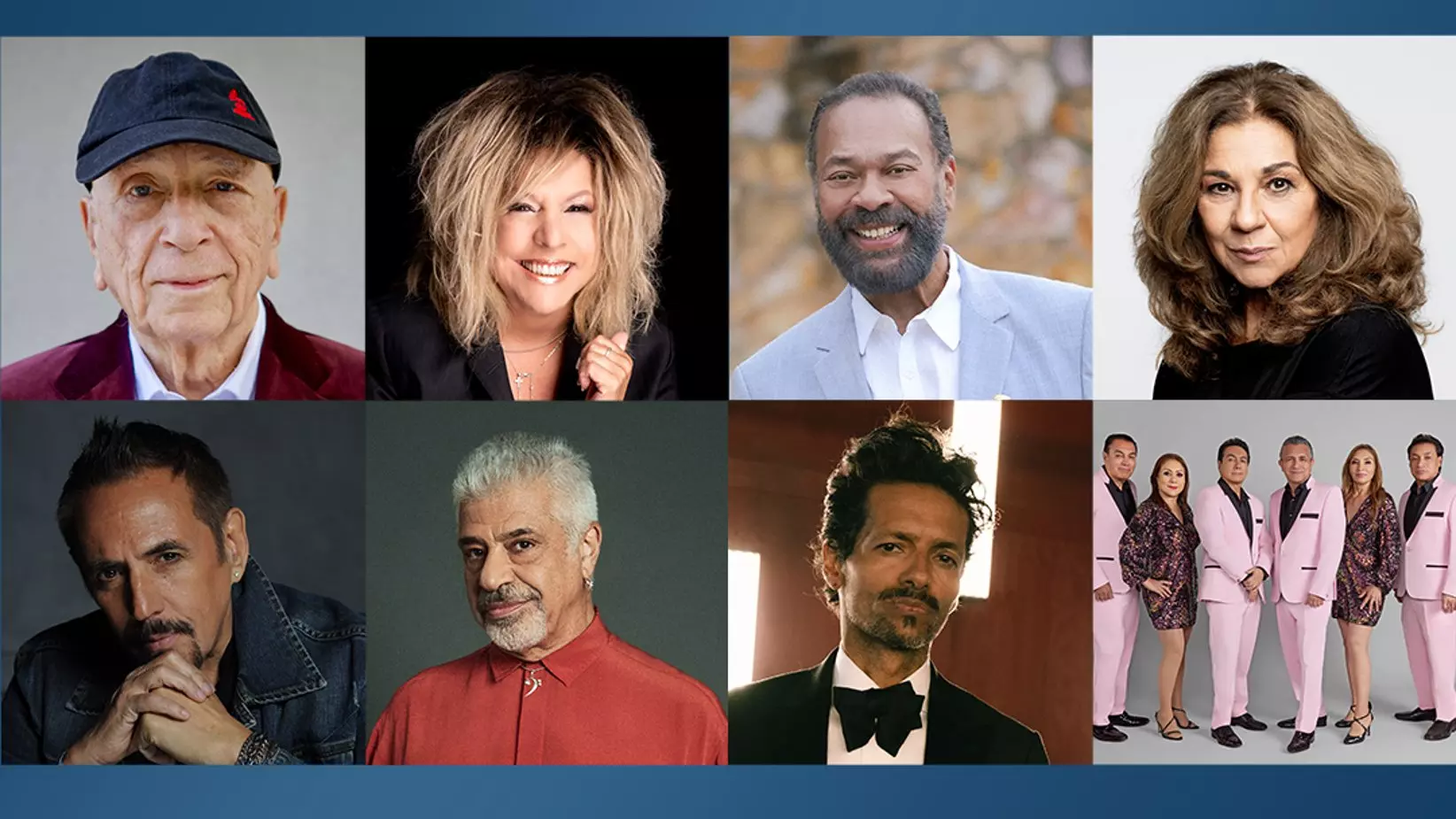
The Latin Recording Academy Announces 2024 Special Awards Recipients: Los Ángeles Azules, Draco Rosa, Albita, Lolita Flores & More
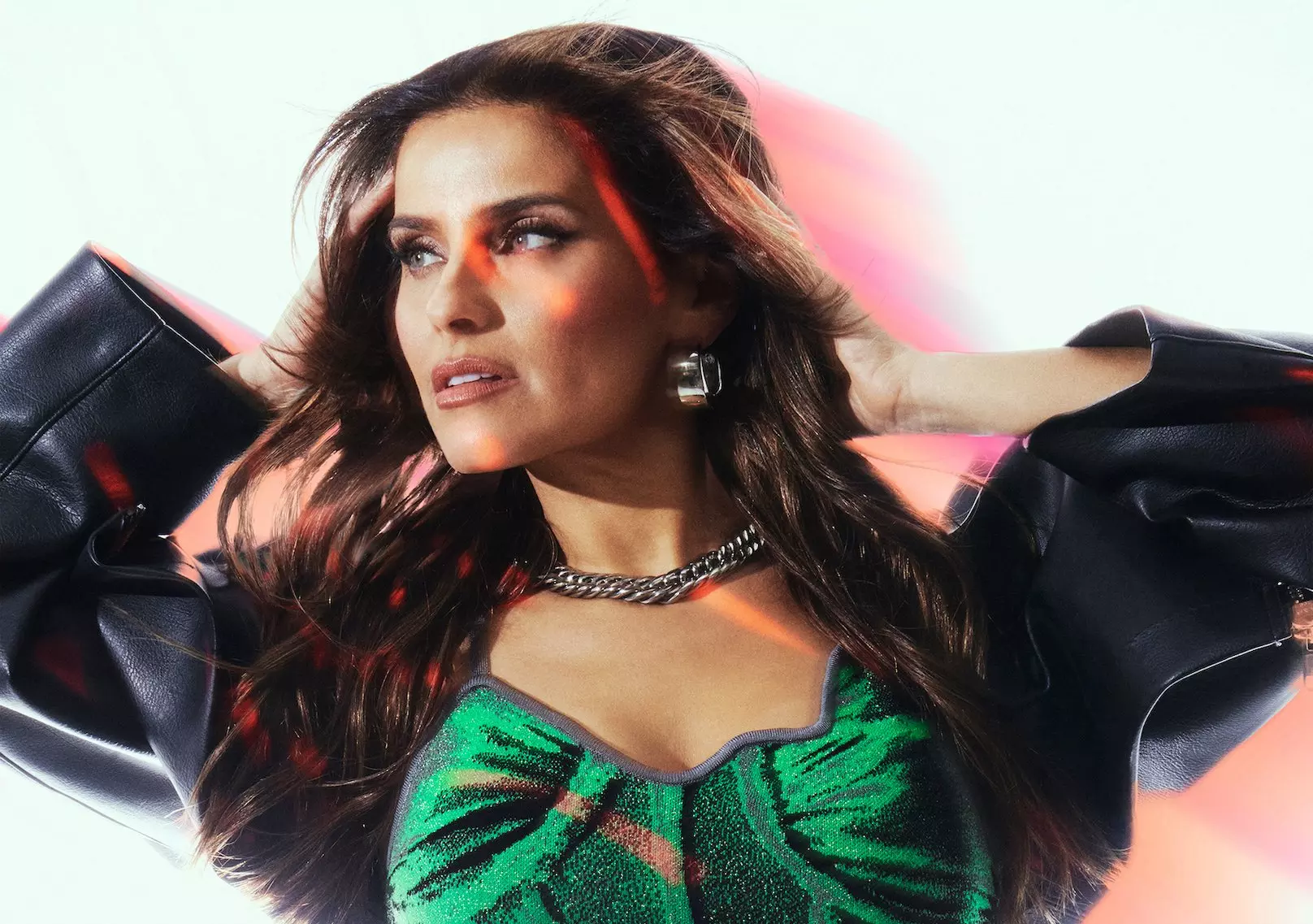
Nelly Furtado On How Remix Culture, ADHD & Gen Z Inspired Her New Album '7'
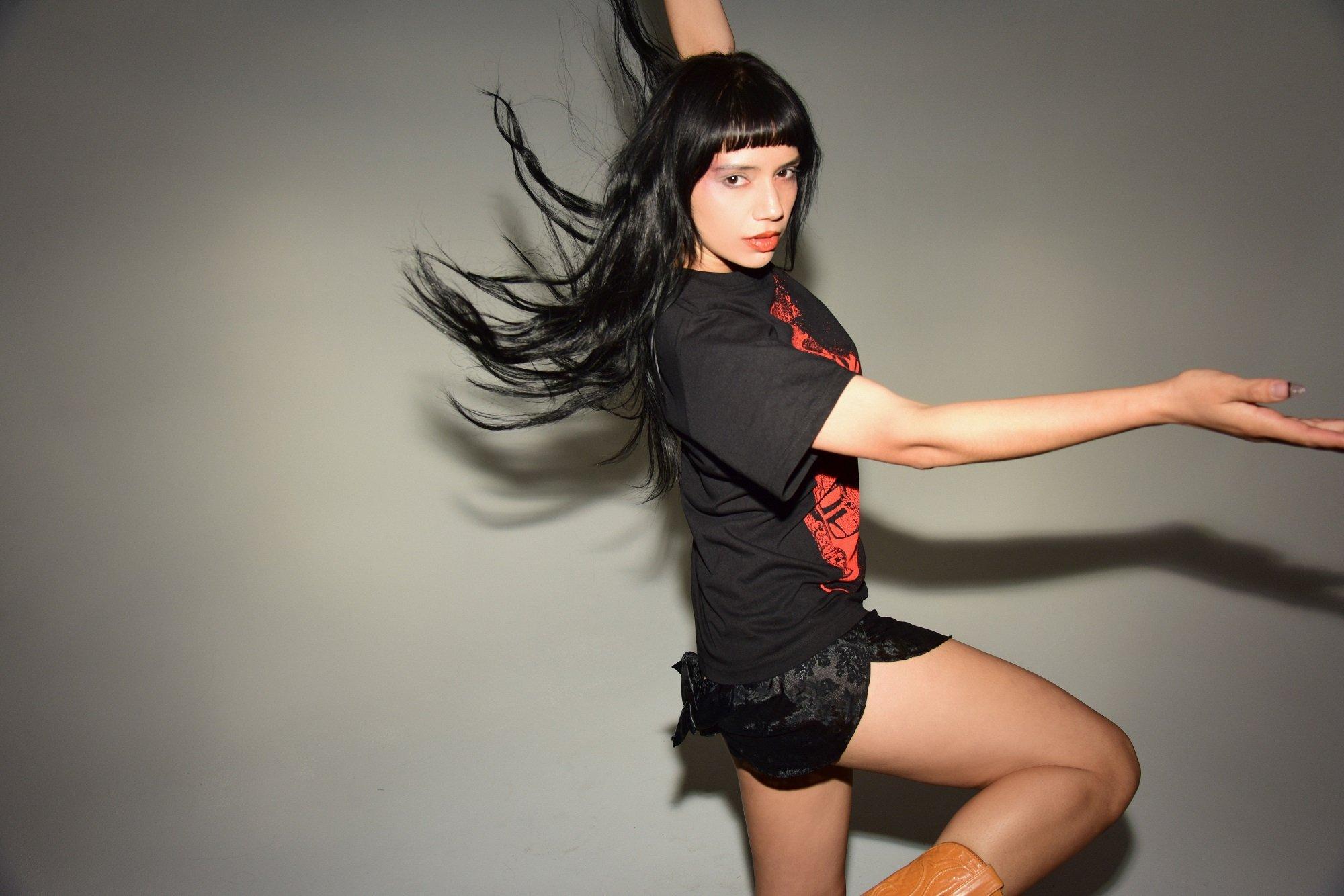
Photo: Shervin Lainez
interview
Angélica Garcia's Intuition: How 'Gemelo' Was Born By Embracing L.A., Ancestry & Spanish Language
When creating her new album, 'Gemelo,' Angélica Garcia relied on her "spirit self" for guidance. The Los Angeles native details how she arrived at her first Spanish-language release by following her intuition and embracing her family history.
Early in the spring of 2020, Angélica Garcia felt like she was being called back home. The singer/songwriter had spent the last three years in Richmond, Virginia, but her roots were firmly planted in California.
She’d spent most of her life in El Monte — the city in the San Gabriel Valley just 20 20 minutes east of downtown L.A., where she was raised by her parents and grandparents. (Her mother, also named Angélica, was a singer who had grown up performing rancheras with her siblings at rodeos around L.A. and Mexico.) Angélica spent most of her childhood moving around the city, learning how to fit in each time she enrolled in a new school. At 17, she followed her parents across the country to Accomac, Virginia — a tiny rural town on the state’s eastern shore.
"It was challenging, but I tried to always see the positive side of those experiences," she tells GRAMMY.com. "In some ways it was like traveling back in time to live there, but I also just thought, Wow, this is a whole different culture that I get to be a part of."
After high school, she moved to Richmond and fell into the city’s indie scene, performing in several bands while recording and releasing her own solo music. Her semi-autobiographical track "Jícama" made it onto President Obama's 2019 year-end music list, giving her a boost of recognition just before she released her 2020 album, Cha Cha Palace. The album was a celebration of her Salvadoran-Mexican heritage, bursting at the seams with influences from across the Latin American diaspora, merging cumbia, ranchera, and reggaeton with psychedelic rock and pop.
Just before the pandemic, Garcia felt as if she "was being called to start over in L.A." With COVID-forced closures throughout the city, it wasn’t quite the return Garcia had hoped for. It did, however, present an opportunity for grounding and reconnection — not just with Garcia's hometown, but with roots, culture, and voice.
She turned inward, dredging up gnarled, complicated feelings about her identity. She’d started to find success writing music that she felt deeply connected to, but Garcia was also grappling with the realization that it was written in a language neither of her grandparents spoke. She turned to poetry, trying to work through her feelings of grief and disconnect.
Slowly but surely, those words became the first inklings of Gemelo. Produced by Chicano Batman’s Carlos Arévalo, the 10-track album explores duality and belonging, following Garcia’s journey of acceptance from the ethereal musing of opener "Reflexiones," to the wild joy of closer "Paloma."
Her first album sung almost entirely in Spanish, Gemelo is Garcia triumphing over her doubts, following her intuition into an otherworldly pop soundscape that transcends borders.
Ahead of her upcoming tour dates opening for IDLES, Garcia spoke with GRAMMY.com about processing grief, writing in Spanish, and finding inspiration in her ancestors.
This conversation has been condensed and edited.
What inspired your move back to California?
I loved living in Richmond, but I was having a really hard time towards the end. Moving kind of felt like something that I had to do. That was one of the difficult things that I was navigating around the time of writing Gemelo.
The album touches on the concept of grief and loss, but also discovery. What was going on in your life as you were writing it?
The record feels like traveling through grief. In real life, I was processing some really difficult changes and adapting as a person. I felt like there was a version of me who was going through the motions and phasing in and out of grief. My body was there, but my mind was somewhere else. I felt like I was almost in a dissociative state.
How does that sense of self you were grappling with tie into the album’s title, Gemelo?
It’s funny, it almost feels like the album revealed itself to me over time. I was maybe three or four songs in before I really started to see a through line between them. I wasn’t sure they were going to turn into an album, but they started to feel like part of a body of work.
In the beginning, I think I kept noticing these themes of reflection, the idea of past lives, all these emotions that kept coming up. Later, I was searching and searching for a record title, and I kept seeing the word "twin." I hadn’t actually tried translating it into Spanish, but when I did, it was like a light bulb went off. I heard "gemelo," and everything made sense.
What about the concept of twins were you drawn to?
I often felt like I had this intuition guiding me and helping me through some of these decisions, and helping to protect me. That, to me, is my gemelo. We have the version of ourselves that exists in the physical world, and then we have an intuitive self, a spirit self, that’s guiding us, even when our tangible self is too confused to really understand everything.
Most of this album is in Spanish. What’s your relationship to the language? Did you grow up speaking it?
It’s always been a very core part of my childhood and my formative memories. Most of the people that I love speak Spanish. So even if I wasn’t always exercising it every day, anytime I spoke to the core people in my life — my grandparents, my mom, or my dad — I was always hearing Spanish. It’s also some of the first music that I learned how to sing, so it felt very natural to me to have it in my mouth and on my tongue.
I just realized I’d never actually tried to express myself as a writer, creatively, in this language. I really wanted to honor that side of myself and my family lineage, and give it a shot.
Would you say you express yourself differently in Spanish than in English?
I feel like maybe it was almost easier to write in Spanish. I’ve been a musician for so long that it can be really easy to be like, "Oh, this is how a song should go," or "I should have a chorus that sounds like this." In some ways, because I didn't have the same framework or rules with Spanish, I was leaning a lot on imagery and on concepts in a way that was a very fun and refreshing challenge.
I think it brought out a little bit more of my philosophical side, because I didn't feel the same pressures that sometimes I feel when working on music in English.
Did exploring that side of yourself also help you connect on a different level with your family and your roots?
I always felt a deep connection to my roots. It can be so easy to just get caught up in everyday life, so it's really fascinating when you look back, and you see the similarities between you. It really makes you wonder how much of it is nature and how much of it is nurture? And how many of these things I do were literally inherited, you know?
How did that seep into your writing for this album?
It’s funny, before I moved back to California, a really good friend of mine in Richmond got really into looking up their ancestry. We would just dedicate time to researching our family histories, and things like that. It was nice to do it with a friend, because you had somebody to talk to about it.
As I was learning, I was writing down the names of my relatives and putting them in a specific area in my room where I would meditate a lot. I would journal with the candles lit, and one day, I was sitting in front of that area and the song "Juanita" just poured out of me. The name came out so clearly.
Some songs you labor over for months, or even years, and they might not come out. This one just poured out like it was raining from the sky. Later, I was sitting around a coffee table with my mom and my grandma, and she was like, "Oh, yeah, your great great grandma, Mama Juana. Juanita …" and I was just thinking, Wait, what? My grandma was telling me how Juana was this mystical woman, and I thought, Wow, she really wanted a song.
In addition to "Juanita," your songs really tap into the stories of strong women, feminine joy, and feminine anger. How have the women in your family influenced your music?
I love the perspective of the women in my family because there’s so much personality and resilience. They’re badass. My grandmother would tell me stories about being a little girl in El Salvador selling coffee, and her whole journey to work at the U.S. embassy, which is eventually how she got to the U.S. And my mother, being a child performing rodeos, told me stories about walking from one gig to another in Mexico with my grandpa because the van had broken down.
Sometimes I feel like people like to focus on their material accomplishments, like money or degrees. But the story of my mom walking from a gig as a child in her rodeo outfit, or the fact that my grandmother went from selling coffee in the jungle in El Salvador to L.A.? That's an accomplishment. That's resilience.
They’re full of these vibrant stories, because they had to navigate through so many trials. Because of them, I experienced a lot of love and magic, care, and nurturing. It’s unfortunate to me that those traits are sometimes seen as soft instead of strong, when it’s both. They redefined strength for me.
Gemelo’s final track, "Paloma," feels like such a triumphant celebration. What significance does that song have for you?
I wanted to end with gratitude. "Paloma" is a song about seeing the divine reflected in each other, in the people you love, and how, even when we're extremely critical of ourselves, we all hold the divine within us. We’re all walking this earth with the power to do incredible things. That outlook has really gotten me through so much in life. It can be so easy to get lost in the grief, but the light is what cuts through all of it for me.
The Marías Plunge Into The Depths On 'Submarine': How The Band Found Courage In Collective Pain
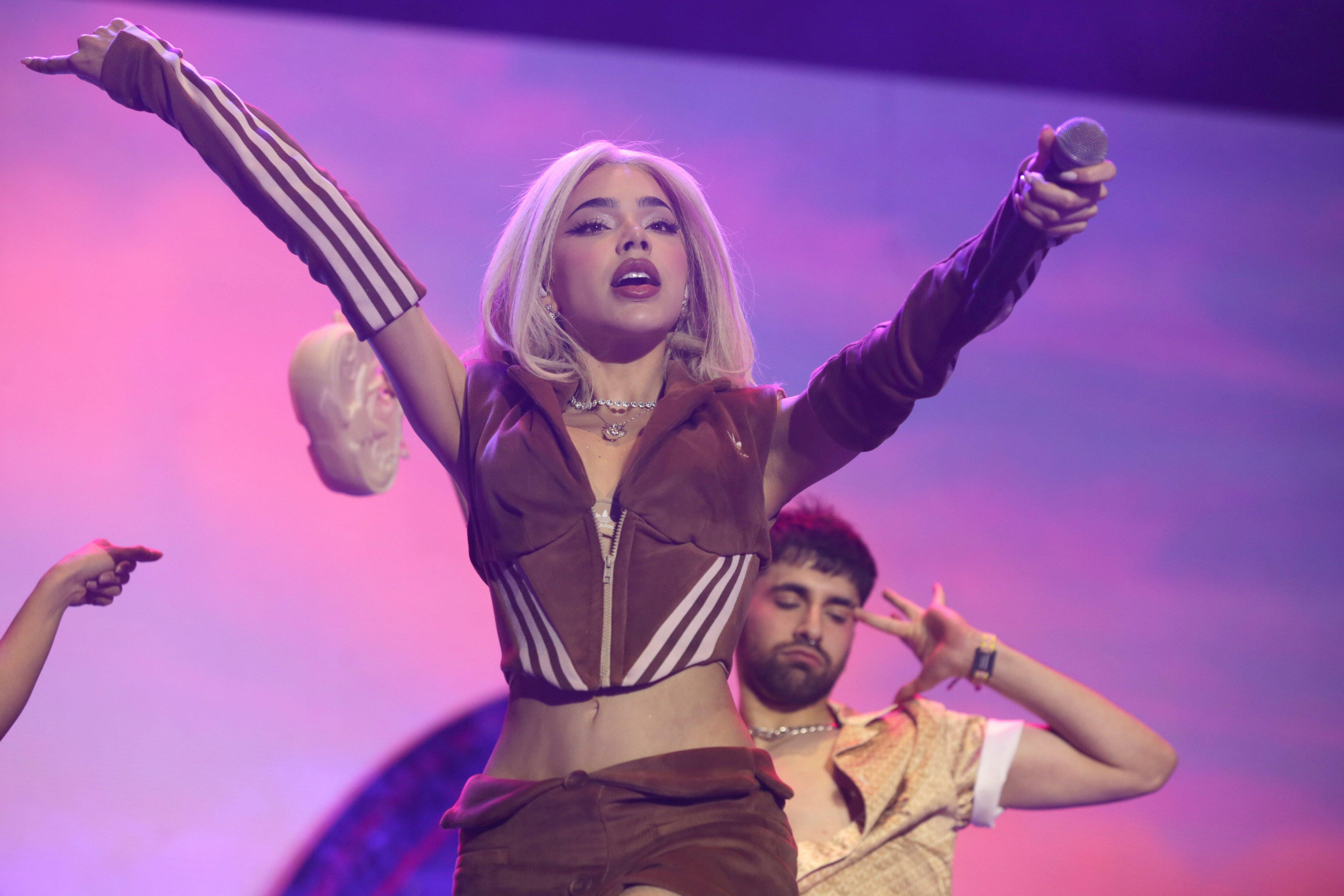
Photo: Ismael Rosas/Eyepix Group/LightRocket via Getty Images
interview
Kenia Os Unveils Her 'Pink Aura': How The Mexican Pop Star Let Her Feminine Energy Shine
On her new album, Kenia Os leaned into a variety of influences — from reggaeton Mexa to trap. The Latin GRAMMY nominee discusses collaborating with Álvaro Díaz, Villano Antillano and others, and letting her inner self shine.
Contemporary music is filled with artists who have transitioned from social media stardom to serious streams and even Music's Biggest Night. Kenia Os is proof of this trajectory: After building a massive following on YouTube, Instagram, and TikTok, she established as one of Mexico's top pop stars.
Kenia Os' ability to pivot successfully is also apparent in her music. Her 2022 debut album Cambios de Luna leaned into trap and reggaeton, while follow-up K23 fully embraced Latin pop with elements of EDM. Her "Universo K23" netted Kenia Os her first Latin GRAMMY nomination for Best Long Form Music Video.
On her latest album, Pink Aura, the 24-year-old seamlessly blends her worlds of Latin pop and urbano music. "I feel very comfortable making pop," Kenia Os tells GRAMMY.com. I also love Latin urban music and reggaeton, especially reggaeton Mexa that's blowing up…I wanted to make music in that style as well."
Pink Aura sees Kenia pushing pop into new territory — with the help of some friends. Puerto Rican singer Álvaro Díaz is featured on the futuristic, drum 'n' bass-infused "Bobo," while Puerto Rican trans rapper Villano Antillano appears on the euphoric "VIP." Argentina's La Joaqui helps Kenia Os meld reggaeton with cumbia on the freaky bop "Kitty." Reggaeton Mexa, or Mexican reggaeton, artists Yeri Mua and Ghetto Kids join Kenia for the sensual banger "Mamita Rica." Elsewhere, Os also links up with another influencer-turned-singer Bella Poarch for the fierce "F* OFF."
In an interview with GRAMMY.com, Kenia Os opens up about overcoming the stigma against artists coming from social media and the empowering meaning behind her Pink Aura album.
This interview has been edited for clarity.
How would you describe the experience of making the jump from YouTube and social media to becoming a pop star?
It's been incredible. It's been an adventure that I've been on for three or more years.
At the start, and even now, it's still been a bit difficult to get respect from the music industry. Since day one when I started making music, I've always taken this very seriously, making great music with good producers and my record label. I feel very confident about this new album that we've put out and I feel fulfilled as an artist.
As someone who did come from social media, what did your Latin GRAMMY nomination mean to you last year?
That day I cried all day. I couldn't believe it. I was very happy. It made me think about all the effort I’ve put in these past few years, and those times I was tired in the studio and thought about quitting. There were times I told myself, I don’t want to keep doing this because it’s very tiring to prove [to people] the artist that I am. I felt like everything was worth it. The hard work that me and my team have put into this over the years has been worth it.
An artist that has a similar career trajectory to you concerning social media is Bella Poarch. I can imagine that you probably bonded well with her while collaborating on the song "F* OFF."
Working with Bella was an incredible experience. Sometimes when you do collaborations, there's artists that are very much artists. You know what I mean? They love music, but they don't know a lot about navigating social media or what works in that space.
With Bella, what happened was that we could record TikTok videos and create content for social media. It was very natural and genuine. We shared ideas with each other like, "We'll make TikTok videos this way or you go here and I go there." [Laughs.] It was very genuine how we developed the content for marketing our collaboration. It was very beautiful. It's a very different experience to work with someone who also understands social media.
Tell me about the title of this new album — is there a story behind it?
My fans have asked me, "Kenia, why do you have everything pink? You have said before that you hated the color pink." It's not that I hated pink, but I had always said I didn't want pink in the background of my interviews, in my outfits, or anything.
The other day I was with my mom, looking at photos from when I was a little girl, and I saw everything in my room was pink. I was thinking about when I started fighting this color. I realized I started to hold back that feminine energy to be able to face the industry, to be the person in charge of my family, and keep up that livelihood. For me, this album was forgiving that feminine energy, embracing it, and healing myself, and above all, letting it shine.
You’re bridging the gap between Latin urban sounds and pure Latin pop on this album. Was that what you hoped to accomplish with that kind of fusion?
I feel very comfortable making pop. I love pop and it's the genre I enjoy the most. Every time I'm in the studio, I'm writing with my co-writers and producers, and we always make pop.
I also love Latin urban music and reggaeton, especially reggaeton Mexa that's blowing up. We have artists in that scene who are becoming very big. I feel very proud and I wanted to make music in that style as well because I like going to the clubs and I like to hear myself within that genre.
You collaborated with one of the top female artists in reggaeton Mexa, Yeri Mua, in "Mamita Rica." How would you describe the experience of working with her?
That was very beautiful. We went to the studio together and there was her whole team. There were her co-writers.
We were all surprised because you would think that she puts effects on her voice, but no, that's how she really sounds. As we say, she sounds very sexy and makes noises like meowing. [Laughs]. It was very fun! It felt very great to work with her.
All the reggaeton Mexa that's coming up in Mexico makes me so happy. I believe it was time with Mexico making more noise globally through música mexicana, reggaeton, and pop, and above all, with a sound that's very unique to us.
You’ve always supported the LGBTQIA+ community throughout your career. On this album, you collaborated with Villano Antillano, who is breaking down barriers for queer artists in Latin music. How did the song "VIP" with Antillano come together?
It's very beautiful to know that I have a lot of fans in the LGBTQIA+ community and that they identify with my music and feel supported by me. It's very important for me to be someone who can speak up for them; it's important for me to support them as well and spread their message through my music, what I say, and with what I do. I stand with them and I'll support them in any way that I can.
Villana is one of my favorite artists. I love everything that she does. When she jumped on this track and we heard it, I almost wanted to cry. The song was perfect for her. When I met her, it was incredible because we connected a lot as friends. We were laughing the whole time while making the music video. We have the same ways of saying things. I love her so much. I loved getting to know her and I got a great friendship out of this collaboration.
What do you want people to take away from the 'Pink Aura'?
I was telling my girlfriends the other day that this album is perfect for when you're getting ready [for a night out]. When you're in your room getting ready and putting on creams, perfume, and makeup. Then you have a little drink before going out to party.
This was made so people can enjoy it and connect with it in their room, in their cars, and in the clubs. It was made with a lot of love and the most pink side of myself and feminine energy that I hope resonates with girls and boys too. I want to heal that part of us that we sometimes hide or put to the side in order to face certain situations in life.
What do you want to accomplish next with your music?
I want to go global. I love my country and I love that my concerts in Mexico are always very full. The people of Mexico love me a lot, but I want to take my music to other countries. I want to be an artist that is internationally known.
I love pop and I see myself doing pop all my life, but I want to experiment with more genres. I would love to do another reggaeton song and then a corrido tumbado song with guitars. Above all, I want to hold the flag of my country high up wherever I go.
10 Women Artists Leading A Latin Pop Revolution: Kenia Os, Belinda & More
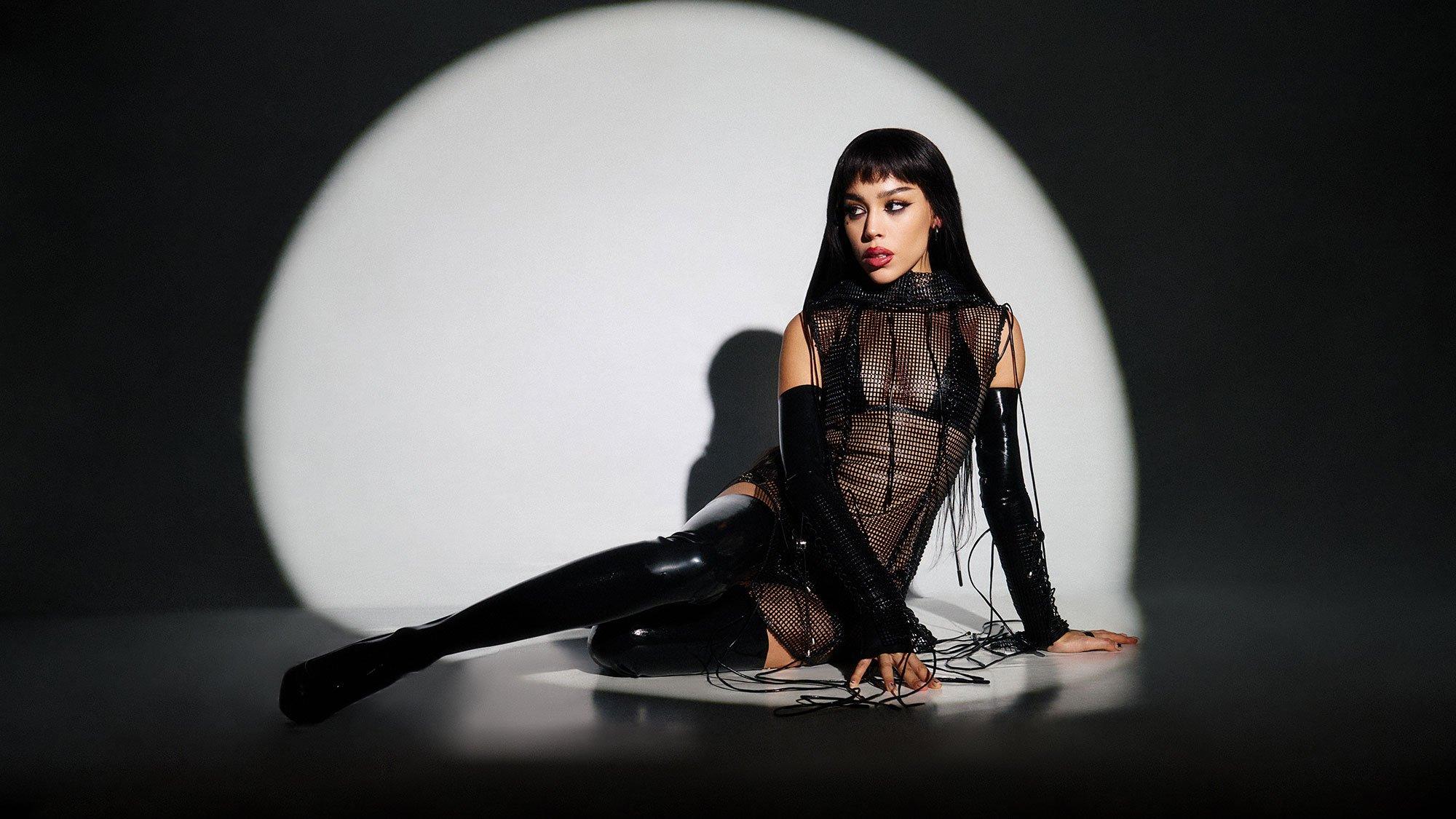
Photo: Rafael Arroyo
interview
How Danna Paola Created 'CHILDSTAR' By Deconstructing Herself
"'CHILDSTAR' is the first album in my entire career where every inch, detail, and decision are curated and made by me," Danna Paola tells GRAMMY.com. "I made an album for myself and that little Danna who has always wanted to do this."
Danna Paola feels comfortable coexisting with her shadows.
The Mexican singer, model and actress first appeared on television at age five, and has spent recent years dwelling on memories of her youth. Now 28, Danna is dismantling the myths and taboos around her artistic persona.
This process resulted in CHILDSTAR, which arrives April 11. Danna's seventh LP is her most authentic production and one where she makes peace with her childhood.
Accomplishing this freedom took her two years of therapy, the singer confesses to GRAMMY.com. "I deconstructed myself and my beliefs and unlearned many things to learn new ones. The pandemic also opened Pandora's box. That's where everything came out."
Through that self-discovery process, Danna knew she had to break with a constant that had accompanied her for two decades: acting. The last character she portrayed was Lucrecia in the Netflix series "Elite," a popular role that led her to reignite her music career after an eight-year hiatus. Beginning to live authentically, without the vices that fictional characters can leave behind, was the crucial step that led the Latin GRAMMY-nominated singer to CHILDSTAR.
CHILDSTAR follows a lengthy depression and a break from her management team, which Danna has described as controlling. On the new album, she embraces indulgence — singing about female pleasure for the first time in her career — and draws inspiration from her after-hour encounters. CHILDSTAR's darkly powerful electronic rhythms and synth-pop, tell a tale about a weekend of partying, alcohol, and sex to create the perfect escape from "your demons, your life, and your reality."
Ahead of her album release, Danna Paola discussed the processes that led her to break with her past, how her boyfriend was instrumental to her return to the studio, the synthesizer that inspired the album's sound, and the gift that Omar Apollo left for her.
This interview has been edited for length and clarity.
Tell me about the process that led you to co-produce for the first time.
This album is made with a lot of love, many hours, but above all, a lot of freedom. It's a very energetic and aggressive album, liberating.
It was a journey of introspection, empowerment, and self-confidence. Beyond being a sad story, the complete meaning of the album is not to talk and throw shade at my childhood. [It's about what] I have discovered since that first therapy session to find and make peace with my past, and that instead of being a place of embarrassment for me, it empowered me.
CHILDSTAR is the first album in my entire career where every inch, detail, and decision are curated and made by me. That's something that I am very proud of. I made an album for myself and that little Danna who has always wanted to do this.
It is energetic, super intense, and sexual. Electronic music, funk, dance, synth-pop, and R&B lead me to drain all these emotions. The choice of each song, and the details and creating them from start to finish, [has] been very cathartic.
In "The Fall," you sing, "You don't know me, you don't know s–– about me. I'm not a shooting star." Was it painful to relive the memories of being a child star?
Yes. I grew up in 2000s television. Back then, creating a child's image came from a lot of machismo: being the perfect girl, the girl who doesn't speak badly, the girl who smiles for everything, and whose characters are all good. She can't do bed scenes, can't talk about sex.
With this project, I embrace that [version of] Danna. I told that girl that everything would be fine. It's OK if you make mistakes, and it is OK to fall in love. Falling in love terrified me because I've been on different projects… every six or eight months; the longest a project lasted for me was a year. I made relationships with people and friends, [but] people always left my life. I built a pretty lonely life; I almost did not spend time with my family. I poured my life into work.
I had this distortion of reality where Danna Paola was the superheroine, and I forgot who Danna was. That's why I stopped acting; creating characters and being in someone else's skin was moving me further and further away from discovering myself as a human being in the ordinary course of life, of creating myself based on situations, emotions, and relationships.
In therapy, of course, I understood that. I made peace, and today, I am discovering many beautiful things about myself as a child that were precious, happy, and full of love. Of course, I don't blame my parents because they did their best. Nobody teaches you how to be a child star from age five.
The album led you to shine a light on your darkest sides. What did you discover about yourself and Danna as a person and artist?
I was terrified to take risks, to speak, or to create. [To me] creating a project takes a long time, at least with music. I discovered that, for me, [making music] is a spiritual act. It is an everyday practice. It is to continue to discover and continue to learn. It's falling in love again with my profession and giving the industry another chance.
I also learned that our capacity for reinvention is infinite so we can start over. Today, I also begin to be a little more human. However, I don't aspire to be an example for anyone. I want to share my experiences and the lessons I have learned so I can move forward, continue to love what I do, and not lose myself. I used to say that I wouldn't make it to 27. That was in my head.
I'm making a wonderful balance between my personal life and my work. I'm also building my family at home with my boyfriend [artist Alex Hoyer], my two little dogs, my friends, and my chosen family. It's making peace and creating the life of my dreams.
Do you like who you are now?
I love it. I continue to polish many things about my personality. I work hard to be a better human being. Life is about learning and transforming yourself. I can release another album in a couple of years; I may release another this year. I don’t want to stop making music. [I want to] continue transforming myself through my art.
In the first two tracks, "The Fall" and "Blackout," you repeat that people don't know you. How would you describe the Danna of this record?
She's a woman who is very sure of who she is, and nobody has given anything to me. I'm in love with my project, my music, and my life, and I'm enjoying it a lot.
I struggle a lot with fame, but today, I present myself as a liberated woman in a good headspace. I don't pretend to be perfect or an example for anyone. Quite the opposite; all I do is share experiences, lessons, and music.
I'm an artist in every sense of the word. I'm a creative, honest person and have a lot of love to give, and I love receiving it, too. That should be mutual. It's an energetic practice that when one really does things with love, the universe always rewards it.
In songs like "Atari" and "Platonik," you openly sing about female sexual pleasure. Is it the first time in your career that you sing about your sexuality?
Yes. This album is very sexual. There's a taboo when it comes to women talking about sex. In reggaeton, there are thousands of ways in which we can talk about sexuality. In my case, I had always considered it forbidden.
It's what I told you about the kid [actress] who doesn't [about sex], who's a virgin until marriage. There is no richer pleasure than sex and the sexual pleasure you can have as a woman. There's liberation, to feel good about yourself, with your body, and also the sexual education that I can also share with generations.
This liberation with my femininity is something that I also discovered: The pleasure of being a woman and having many experiences in my life that have led me today to enjoy who I am, to have a happy sex life, and to share it through my music.
In "Platonik," you discuss sexualizing a platonic relationship with a woman and sing "I can't help what I think in my bed." Why was exploring that relationship important to you?
I had a platonic love with a girl at a stage of my life. I kept this to myself; it was a personal experience that opened the conversation to a beautiful story.
I wrote this song with [producer and songwriter] Manu Lara. We made it in half an hour. This song has something unique because, besides talking about a personal experience that is also super sexual, it talks about universal love.
That's why I say that CHILDSTAR is an album of many stories that have marked my life and beyond, talking about only the childhood stage, which is what everyone speculates, but that's not the case.
You’re flirting more with synth-pop in this album. What caught your attention about this genre?
It comes from this aggressive part of saying, here I am. For me, electronic music connects and drains emotions. Every time I've been out partying, electronic music has been liberating for me, and when I put it together with pop and these lyrics, it has become a new way to enjoy the genre.
While creating CHILDSTAR in Los Angeles, I fell in love with a Jupiter [synth] we found at Guitar Center. That synthesizer is in every song. The inspiration [to use the instrument] comes from John Carpenter's synth album [Lost Themes III: Alive After Death]. In it, I discovered synthesizers had a way of incorporating sound design and darkness into the album.
[Synth-pop is] the expression of that need to bring out the energy I had stuck through music. It’s an emotional purpose, the connection I have with electronic music.
Your boyfriend, Alex, was instrumental in making "XT4S1S" when you didn’t want to enter a recording studio. How was reconnecting with music with help from your romantic partner?
"XT4S1S" is the song that, to both of us, as a couple and as producers, connected us on a hefty level.
I was super blocked. It took me several years to get out of my depression hole. We returned one day from [La Marquesa park] here in Mexico, and started chatting. Alex opened his laptop and started pulling out a beat.
I started throwing melodies, and [shortly] we had the chorus. It brought me back to life. I started crying with excitement because I finally felt again these desires and this emotion that you feel when you create a song, and you can’t stop moving forward and keep creating.
I remember we recorded my vocals on a voice note and sent it to [the production software] Logic. Then, it took us four months to produce this song because it was a lot of discovery, in this case, for me as a producer.
Alex is a great musician, artist, a genius — and I don’t say that because he’s my boyfriend. Artistically, there’s a fascinating world inside his head that I have learned a lot from.
The track "Amanecer," which features Omar Apollo, breaks dramatically with the story you tell in the album. Why did you end that party cycle with a more folksy, chill song?
"Amanecer" is a track that has us all in love. It was the last song I recorded for the album.
I wrote it to my ex. On my birthday, he called me — I was already with Alex — and it was super weird. I always feared running into him on the street, seeing him with someone else, and feeling something. And it was the exact opposite. I had already healed internally, and that wound had stopped hurting. I stopped feeling all the emotions I had gone through in K.O., [the album nominated for Best Vocal Pop Album at the 2021 Latin GRAMMYs].
This song talks about knowing how to make peace and understanding how to let go. It’s the dawn of the album. It’s perfect to release all the drama, and all the intensity, and aggressiveness that is the entire album itself.
[The song invites you] to hug yourself and say everything will be fine. There is always an opportunity to start over.
It also has a beautiful story. Manu [Lara] taught Omar Apollo the instrumental parts of the song, and he made some melodies. At the moment of receiving them, [Omar] agreed we would make a song together, [but] it was almost impossible to record together.
[Instead, Omar] told me "You can use the melodies I made" and left me the last part of "Amanecer." He left us with that magical essence.
10 Women Artists Leading A Latin Pop Revolution: Kenia Os, Belinda & More
